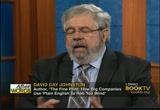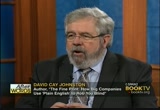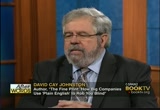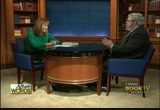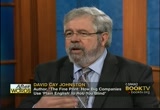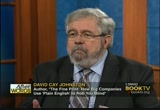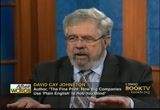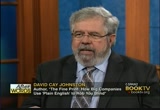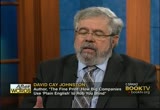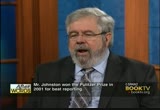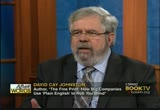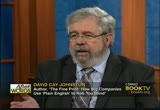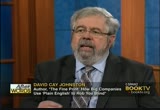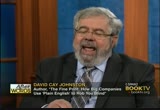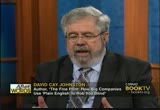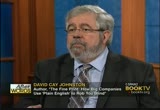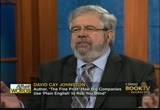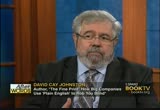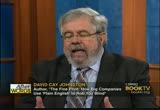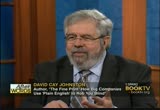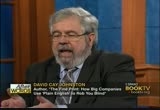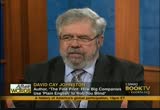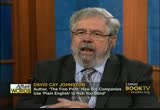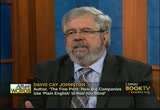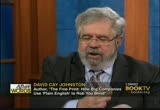tv Book TV After Words CSPAN November 11, 2012 9:00pm-10:00pm EST
9:01 pm
raise prices and lower wages and what i document and the fine print is how remember of big corporations would have tried to thwart the market competition they provide a really poor service compared to some industries some countries in the world and put lives at risk and how we don't have a balanced system focused on competitive markets. >> host: we will go through some of these specific examples, but to you what was the most egregious what stands out to you as the most egregious in the towel was a little bit about it. >> guest: it's about a man named bob manning was a 26 your alignment for the electric power company in upstate new york in
9:02 pm
february of 1962 as he was coming off of the poll he went headfirst into the pavement and i met bob in 1967 when he called "the new york times" asking for help because he couldn't collect the compensation benefits for 35 years later but that isn't a story i tell in the book. the egregious story is the power company was sold, the insurance company that has the claim owned by a bunch of utilities was then sold and the heady finding that there were no cases of refusal to pay benefits. didn't read "the new york times" and with the governor said? we aren't paying attention to what is in the newspapers and i said what about the complaints and he said nobody got a final judicial ruling that they refused to pay him. sedated ultimately pay some of the money.
9:03 pm
and then the insurance policy was blocked by colin reid, a warren buffett company and a nurse comes around ingratiating manning's live in sacramento california where he had moved and eventually she goes to his home which they have a right to do and the man has these wonderful people the adopted three children who the parents were killed and one of them grew up on a pilot and this nurse goes into bob's room and comes to the wall and says why don't you have a dnr it means do not resuscitate. in effect asking him to die. bob's wife, his nurse, his doctor come all the people that saw the nurse do this and her other actions were just appalled by this.
9:04 pm
warren buffett didn't know of this. on the other hand what does he say about his company? so long as my managers make their numbers, i know the business they see fit and it's indicative of the callousness that is going on where we don't have balancing and we are so focused on profits you can have a company go and say please die. host could you talk in your book about these industries that have been deregulated and people think about regulation in terms of a democrat versus republican issue but or more of the problems created because of democrats or republicans or is this not a party related? >> guest: there's one party and we would have to behave like every member of congress does because if we want to get
9:05 pm
reelected we have to listen to the people to provide the money to pay for the campaigns. the wealthy individuals who all come pleading. what they really want to do is on level the playing field and the rigor of the market and there is no such thing as deregulation. there is only reregulation. so taking regulations not cling to defend every regulation but we took the scheme that was balanced in the interest of companies and looked at the interest of customers and other parties and replaced it with a system by the corporations that takes away consumer rights. everything is regulated. baseball regulates down to how many are on the wall and what color the yarn is. everything is regulated. most of the regulations in the federal code of regulation and
9:06 pm
the state or sought by corporations. business seeks regulation to devotee find playing field but more importantly to try to prevent competitors and escape the competitive markets. >> writing the regulation. it's written by the companies. >> you've seen it and everybody that works near the factory has seen that happen. >> all of the groups have a lot less power and influence over the corporations. >> host: so the powerful faces in the book to me or their rickety economy but if you could explain a little more clearly. >> guest: in a competitive market the government would set the rules and as the germans do with what they call the liberalism adjust the rules as the businesses play the rules you are not going to have
9:07 pm
protection but you have to make sure the playing field because the market will figure out best who should succeed in the capitalist market to head towards monopoly or duopoly that getting bigger and bigger and bigger and when that happens when you get is the ones you are a monopoly or duopoly come you don't want to invest in innovation you just want to mind the market and to rent seeking by which they mean earning profits greater than you would get in the market economy. when you add to that all of these rules and regulations in the book and every chapter as i am sure you've read things you haven't read in the news media show how again and again and again the market is being rigged but this is terrible and helps explain why in the economic doldrums we don't have the job creation we should be having.
9:08 pm
>> host: let's go through a few of the examples and then get back to some of the ones that may have stood out more for you. how about the internet. the fact that during this race we have the highest in the world and we are 29th in speed. explain how did that come to be? >> guest: it was set up by academics in the military through the what's now called the defense advanced research projects agency. so we began at number one, and back in the 90's al gore tells the senator and vice president and others promoted this idea that we would have this wonders thing called the internet and when the browsers can along it meant they were not the only people that could use it and we have what we know as today the internet.
9:09 pm
the telephone companies and the cable companies went to capitol hill and state legislatures and said we're going to build of this fabulous thing and there was a television ad that ran that i talk about where an old geezer like me but finn paulson to this motel, drops the satchel and says behind the desk king size beds entertainment, she looks at him and says every movie ever made in every language in every room. this was shot in the mojave desert. the rest of the world is doing that. the other has been made universal. america ranks 29th in the speed of its internet behind such leading industrial life of the world as moldavia and ukraine. we paid the highest prices in the world by far by one measure we take 38 times with the japanese pay for information. if you buy these packages, and i
9:10 pm
have one in my home, you pay on average with taxes $160. in france to pay $38 get worldwide calling to 70 countries not just u.s. and canada, worldwide television not just domestic and the internet is 20 times faster uploading and downloading and you are paying less than 25 cents on the dollar. all these other countries understand a fundamental principal in the 19th century the canal and railroads were the key to economic growth as industrialization came along and you had to move heavy things like steel. as the 20th century can along it was highways, interstate highway program for example and airports that were crucial to economic growth that is the super highway and they don't call it that anymore. the rest of the world is getting information superhighway. >> host: people literally say
9:11 pm
that? >> guest: the chief person at verizon to read the was a phrase that isn't used any more and they have the fiber optics but not to your home. but the companies are not wiring the whole country the way these others are. universal access, high-speed internet would lead to products and services i can't even imagine what they are but if you build it they will come and so the other countries are doing this and we are going to be left in the dust economically and the company is run to the state legislatures and they get all these little changes in the law that i tell about that say you don't have to provide service to everybody. the innocence 1913 they have the right to a telephone. five states have repealed that all. i think it's florida, alabama, texas and wisconsin. i can't tell you a single newspaper, telling me this. i've called the nafisi group's who deal with lifelong access
9:12 pm
for disabled and poor people. we didn't hear that happen. so the news media -- >> host: if you're that far away. >> guest: one of the arguments made is we don't have a monopoly made in the more we have these competing services with cable companies and cell phone companies that isn't the equivalent of the other services but under the rules they pass in many places you could have a cable company and phone company cutbacks or fiber-optic running down the street and refuse to serve you and the building with 100 units and only 40 people on the service and approve of that is a building in jersey that has and then why year for four years. they have among the residence the chief rate payer advocate for new jersey. when i wrote about that i thought surely some executive in verizon will say that's kind of not politically smart to do. they will figure out how to get these people to wander their building they wanted to see the
9:13 pm
plans because it is a lovely building and they didn't want damage done. that's how much power the companies have and if the chief advocate for the state of new jersey can't get fiber-optic service would help to you or i or anybody listening half as they are rewritten to take away your rights and invest all of the power in the company and then cut out the state regulators who were there to protect you. >> host: what would you tell the consumer that i know you recommend people get more involved politically but what can you do? >> guest: this book has a lot of solutions about taxes and subsidies in the new york times' position was to write solutions to express the by yes so this book has lots of proposed solutions for what to do about it but all of them and in the same sentence. reform begins with you. my job as a journalist is to dig this out of the record and to
9:14 pm
the investigative work that is needed and explain it to you so that you can understand it. now what is your job to do something about it or live with the consequences of it. >> host: if you were living with it in new jersey but what you do personally? >> guest: i would come to the company everywhere i couldn't go to the state legislature and say i'm sorry we have a nice beautiful building in your position is they can punch holes with no regard for our property or we don't get service to it i would make noise with the legislature and get their attention. most of the lawmakers that pass these have no idea what they are doing. they've never read the bills and they never will. >> host: the ramifications. >> guest: that's right and they say that's what this is about or the leadership centered around a note and only a handful of people actually get in and learn what these are about and if there is no pushback and there are consumer groups, a government-funded organizations to look out for the consumer as well as private groups then you
9:15 pm
get this one-sided development into law. it's syracuse i teach now one day a week in the law school and the history of these things, property tax and business regulation on the other we start with the code and everything in the law to a pretty much as in the code from insurance to business regulation to the rules on loans to defenses for white-collar crimes and how to test them and they were developed out of thousands of years of experience. what we are seeing now is these big corporations very quietly when nobody notices and doing thousands of years of human experience to their benefit and to the detriment of the overall economy. >> host: is there a solution in the state legislature? should they be paid more?
9:16 pm
should lobbying restrictions be greater? >> guest: this is a difficult problem. districts me that one of the solutions we should be having an active discussion about is the two states have tried this in arizona to get thrown out which is kind of surprising. the constitution gives you the right to lobby. the first amendment says the right to petition for the redress agreement doesn't regard any response by the government it only requires the acceptable issue but i don't think that is in the state capitals and washington is what the founders had in mind because it is the company with campaign contributions or the threat of contributions to other people with you don't play ball and they are they only people that are really being heard. so i think a fundamental reform of the campaign contribution system would be important. and in my last book i suggested that we should put in place is a set of rules that once you're elected to an office like this
9:17 pm
you can't go to work with the industry's maybe we should pay lifetime pension and remove you from the economy. i suspect as costly as that might be it would be a lot cheaper than the things we are seeing now that are extracting billions and hundreds of billions of dollars from people's pockets but a market would never allow and getting them over to these corporations. >> host: back to the telecom industry there were remote control profits that were fascinating to me. would you go over that? >> guest: in kentuckians they go the same from scotland and the your famous from being very tight. they had a monopoly cable provider charging them with incredible prices and if you had a little quicker to change channels while you were sitting on the sofa, the couch potato, it was $5 a month. they were able to cut the prices dramatically and still make
9:18 pm
money on the system and they cut it to less than a dollar even that the dollar they make tremendous money you can buy a remote if you look carefully at your cable bill you'll notice its line after line of the tools to sort of get you to not really notice what is going on you probably pay 75 cents a month they buy these things for a couple hours and the fact that they are worth nothing when you turn on your cable box. >> host: not worth the trip. >> guest: $5 a month is indicative of the price. its thousands of% over time and you can do that if you are a monopoly and to be a monopoly in most cases especially in the communications. >> host: the company in kosko is still there? >> guest: what happened is there was an effort by the company to sue them out of business and new gingrich, the speaker of the house and the
9:19 pm
communications act was being debated set up a group on progress and freedom foundation. was to raise money to promote what they wanted. they then put the system in the glass co in red only because of the cost of litigation and when the case came before a well-known conservative judge she listened to the industry lawyer and he leaned down from the bench and said it sounds like you don't want competition. since then, they've modernize the system twice for the municipal system and a charge as much lower rates than the surrounding monopoly providers and the same thing has happened in louisiana and scottsboro alabama and chattanooga that is the fastest internet in america just as over 100 years ago there were communities where wall street said we aren't going to lie here you for electricity. it's not the highest profit margin for us we aren't going to do it so the town then create
9:20 pm
their own municipal systems and overall people that get electricity pay about one-third less. they have fewer outages, better service and by the we even the big systems like the los angeles department of water and power, sacramento, these big systems pay figure salaries to their top executives were in six figures as opposed to some of the private corporate utilities now paying 30 or $40 million a year for the same service and people pay higher prices so the market sometimes is less efficient than local government focused on the betterment of the community. post to it seems there might have been other examples with these kind of companies, upstart companies being far more competitive. >> guest: they were tried and zuckerman to california to start building the system and immediately at&t cut prices way down to nothing and the supreme court is very hostile and the
9:21 pm
pricing because it makes the assumption that he would have to cut prices everywhere. you cut them in one location and run the competitor out of business and keep them out of business by giving that and that is why we see very little real competition in this area. now if i can shift gears on you a little bit here, i live in the rochester new york up by the suburb. my neighbors and by voted to raise our property taxes and today because of that i have more money in my pocket and it's a good example of market economics are not as simple as you would think from what you've heard on most television shows. in the u.s. we have an oligopoly that charge high prices and i show how they tell the government believed with a tightly competitive government and recorded conversations that i quote we've got this fixed and we know how to rationalize the market with competition we're pushing our competitors to raise
9:22 pm
prices how did we raise taxes and cut prices? we have about eight different garbage companies and every day of the week a smelly diesel truck would come down and there would be a trash can on the street. we created a district that we went to the competitive bid and got the lowest price one day a week every single house on the street and my bill for garbage collection went from above $600 a year down to less than half of that so i have more money in my pockets. makes you richer if it depends on how the money is spent but it can also sometimes sneaky wealthier. we took action to create this district. my neighbors did the hard work to make this happen. >> host: one of your solutions a view to the chapter was
9:23 pm
interesting with the screening eliminating the corporate income tax would end the blatant billions of dollars that consumers which is the -- >> guest: it's a utility in new york to the to new jersey. >> host: can you explain that? >> guest: pseg could have the states voted to get rid of the traditional integrated utility the generated electricity in the power plant, transmitted it and then distributed to homes and offices and ran the whole thing top to bottom. in the states where we got rid of that and said we are going to have you buy and the open market prices have gone like this about 48% in real terms since 1999 after you adjust for inflation and this is the case of the wan market rules designed to raise prices not to go were prices. pseg is one of the company's door told you have to get rid of your power plants so they
9:24 pm
transfer them from their regulated utility pocket to an unregulated so they are in the same locations and the same businesses but now the company buys it from itself. but when they did this the companies have already written off most of the value of these plants and there's something called an accumulated income tax deferral account that as the plants have been written down this money gets paid back to the government so it is an interest-free you write it off today and pay the taxes in the future most of the other states especially pennsylvania forgot about the account it sold at an increased price transferred to the same company they are on the game because they already wrote them off so they make the customers pay for what is called the stranded cost that included
9:25 pm
income taxes. the customers are paying twice this income tax and it gets the money and pseg has never denied this. they've always said this is a subtle matter we are not going to discuss this any more. it's over. they were very careful never to divide a pocketed this money. the second part is a utility company has what is called a holding company structure is a you have your local utility you write a bill for your electric water and natural gas but it's owned by another company and they are owned by companies since the and and france because they are favorable. the companies appear operate with borrowed money the company appear makes me be 30%. the highest possible rate in many cases never get the government. it's not that they are delayed
9:26 pm
or the interest on the million-dollar is the holding company is able to set up a mechanism it gets the money in the federal and state government. on the exposed this back in 2002 we think it was in "the new york times" oregon passed a law that said give it to the government or back to the customers. portland general electric, no problem. northwest natural gas, no problem to be immediately they said that's not fair and they got it overturned and what goes on now is warren buffett's utility collect the rate that collect the income tax and there is no evidence that ever gets to the government and therefore the company runs more than it is supposed to burn the and this one does a principal and the law called just and reasonable if owners of the monopoly should earn a just and reasonable profit if they don't like the profit they are not going to maintain the system the customer
9:27 pm
should pay a just and reasonable price but if you see the reasonable price is this and then he threw in this income tax and the company pockets it now is on just and the consumers are losing and the company is gaining and it violates the underlining standard for the regulation. and you know, it is an enormous amount of money. the average electric bill was about 5% of your bill is the taxes. if you can collect 1 penny a day from everyone in america at the end of the year you will have $1,100,000,000. what if you can collect a dollar a day, now you have $111 billion it doesn't take a lot of these deals in the different industries before suddenly you and i aren't doing so well that there's a handful of people utter doing extraordinarily well. >> host: we had one of the statistics that jumped out at me as the one that set from 1983 to 2010 a number of americans for
9:28 pm
36% but the utility workers fell 15%. that i don't know if this area is any worse but every time there's a storm we lose power and a friend of mine that's been a foreign correspondent said he feels like he's in a third-world country losing power so much. how does this go? >> guest: is the washington, d.c. corporate utility which by the bay is 18% of the money from the tax payers including the taxes back to the government is the champion of the tax avoidance. they are better off than general electric. i've met and talked with them and they set up these holding company mechanisms so they make money. they're one of the worst utilities when it comes to service and i wrote about this years ago with the "washington post" did a big investigation and the municipal systems generally have good service records because they run as a public service to make a profit
9:29 pm
so pet car isn't unusual but worse than that on show how the utilities are being hired out, largely people but are traer utility people and women putting monopolies here and who understood this as follows service they've been replaced by financial folks and they've been hollowing out the utilities. so in california gas and electric got rid increases so it could replace the power poles. that's reasonable. the testimony is on average the last 50 years of you will last more than 40 but on average, 50 years. they would replace the polls on a 775 year cycle. they could not 46,000 but about 3,000 poles and year so if nothing changes it will have to last a think 2775. if you are a competitive
9:30 pm
business you don't reinvest in the business and replace equipment, you go broke if you are a monopoly utility when the disaster comes and the collapse you run to the government to get the legislature under the utility stuff to stand up for the public and get roles in plays like the commission has done to say you can't challenge anything we do and there is a fight going on where they dismiss without any discussion challenges to the practice and pipeline deregulate the earning over 50% annual profits and they've given them up. what you do is get this rate increase and then if there is nobody watching it becomes a permanent rate increase so the executives today that report higher profits than the burden on the economic basis and therefore more money from the
9:31 pm
stock-option and in the future those executives will be just fine because they will get more money. >> host: does it happen after these mass blackouts, does it make a difference or they pay a lot of attention in the last service? >> guest: i think this is a fundamental problem. the utility boards are really insulated and when i read about the public utilities in the early 1970's the utility boards that i had dealt have some people that were not directly connected to the industry sometimes the it knowledgeable critics and a brilliant businessman who just died recently and made himself a millionaire before he died who were critics of the industry and thought about how they would encourage them to behave in a way that best benefits the overall economy. under governor schwarzenegger it was run by people in the to the
9:32 pm
industry, the lawyer for the cell phone industry and finance year from the energy industry coming in by quote the editor of a little paper in california, the only people in california besides the l.a. times that's been tough on the bulletin who says the eeoc doesn't stand for public utility commission because they are in the industry he calls it the profit upkeep commission. >> host: some of the rhetoric samples interesting to me, the section on the 401k and retirement, what do you find that you would like to talk about briefly but also is there a lesson we could do as individuals? >> guest: if everybody knew how to invest money the average job would pay wages and it's absurd. for all of my education and
9:33 pm
knowledge of the chicago school and not an economist and i've written about finance i'm not a good investor i just don't spend less than you make. but efficient way to take care of people's old age which there is no use gaping is through defined benefit pension plans and year the industry say we have to get rid of these they are not predictable. you can buy in individually defined pension plan called the insurance company and say i am this age i want money at this age come here is how much i have and tell your gender and get a blood test. what went wrong? companies after the employee retirement income security act was passed in 1974 went to congress and they kept getting this little changed and this will change to not put in the appropriate amount of money. this is not a secret we have had pensions going back four or 500 years but they are getting all
9:34 pm
of these little rules and who pays attention in the news media you mentioned a little rule called subsection 1411 and they are trying to rewrite the order of the presumptions. >> host: that isn't going to play well. >> guest: day under fund of these and to rate them i have a pension that has been thoroughly rated, so the 401k is an effort by one industry, financial services to allow execs to save extra money and it blew up into this big huge system. we need to have a rational policy that recognizes that people need to have money put away from their old age and have a dependable reliable income stream and not one out of money but the average worker in america if it doesn't have nearly enough money to go on so what you will see is more and more people in the 70's and 80's
9:35 pm
the that is a good thing for those that can work i don't plan to retire but what about my brother who is a ditch digger in the reason people get to work on a rainy days he was getting the tree out of there so the road didn't flood come he is disabled now, he can't work. we have to think about the system, not our individual situation. >> host: is there an issue i didn't touch on? >> guest: i spent four years digging this stuff out. >> host: dessel let me to goldman sachs and wells fargo. when detroit was bailed out by washington the ceo and the janitor took a haircut and the execs lost half of their deferred guaranteed pensions. when wall street was bailed out by the administration, nothing
9:36 pm
changed and a lot of people heard the story how they had $13 billion about one third of the capitol with ag and made a bet that would pay off on pennies on the dollar. instead in a meeting of government leaders including the treasury secretary that happened to be the former german they made a decision that led to 100% being paid on the dollar to goldman. there's another deal they made when i go through the analysis it was a $5 billion gift to goldman. they build a new headquarters you won't find their name, how did they build it coming your taxpayers' dollars in large part. it's pretty easy to make a profit and that is one of the things that has been minimal the
9:37 pm
explored and there is a woman here in washington, d.c. a bus driver from school bus driver to buy a new car should not talked into paying three times the value of a used car by a car salesman. wells fargo financed the deal she would have people most $30,000 for a car with interest, she was pregnant and on disability and had to give the car back and wells fargo said we are going to take your house. under the arbitration agreement that everybody signs to sign up for a bank account or brokerage account, body and appliance coming you give up your right to sue and are put in arbitration. if you go to arbitration you might do that once in your life that the arbiters know that it's the bank and the car dealer and other companies become to you every day and it's a repeat player problem they have an economic interest in making happy the people you are up against because they will hire them over and over again. two lawsuits that the american university took this case and creatively ran with it and the
9:38 pm
woman didn't have to pay and will's fargo paid a damage but what did they say to this mother? we will take your house and all of this is because the 1925 federal arbitration act which nobody in the audience has heard of that was passed to the company that had disputes across the state lines and that wanted to go to arbitration had the option of doing so. the supreme court particularly the people like all the radical a historical members of the supreme court scalia, thomas, roberts twisted and extended and expanded this thing to be an anticonsumer law because the hour core protests and they do things that have no basis in history with the constitution claiming and i believe if the federal arbitration act as it is interpreted by the supreme court had a vote today and the plan not to the companies but you and me and ban all sorts of things to make it efficient i don't believe there's a single vote
9:39 pm
from a member of congress regardless of their political or economic views no one would vote for this if it came up today and it's being used by corporations against consumers and small-business owners and franchise agreements and other areas to increase their power over their customers. >> host: you talk a bit about dodd-frank whether it should be repealed. >> guest: the best regulation is the least regulation. you want to have regulation that encourages a virtuous behavior and rewards it and punishes vicious behavior. we had an excellent law called glass-stegall. we have almost no bank failures in this country and gall had a very simple principle you want to be in the gambling business, you want to underwrite
9:40 pm
securities and bonds were sold derivatives and 90% is not investment banking to build factories and offices it is the derivatives trading. go right ahead but you can't be in the retail banking business if you do that and you can't be in the insurance business if you do that and banking and insurance are basically the same business. the difference is to make a positive thing on demand the deposit insurance company you can drop you don't get to withdraw if your house doesn't burn down. when glass-steagall was revealed these were all mixed and this is a terrible mistake so if we go back to the central bank's principal this business has to be supported from this business at this and i think a lot of our problems would go away we want to have regulation based on sound principles rather than trying to micromanage companies which we can't do. >> host: it's something that we said before we were on the
9:41 pm
air people might think you actually like a lot of regulation but you don't. >> guest: and a registered republican and co-founder of little business $2 million a year that my son run flem also not anticorporation. what i am in favor of this understanding what corporations are and what economies are and what we have learned from fells sense of years of human experience and getting the rules right so that the economy benefits from having a system we want people to have a profit but you want people to make a profit by saying goodbye or put your life in danger? no, we don't want that. we've want to have a system where the whole economy prospers and if you take the risks we have to put reward and response of the body to go together and if you just look at the mortgage crisis what did we do?
9:42 pm
we said to the sales agents and the banks nobody will ever pay back and you get three times as much money if you sell the responsible one so guess what people took the money and sell them on the wall street and when the loan sours it can't be sent back to the banks so you separate the risk from the reword and who bought a lot of that stuff on wall street? fannie mae and freddie mac were criticized for refusing to buy these kinds of products. was goldman sachs, lehman brothers, bear stearns and the others and who did they sell them to? public employee pension funds and. >> host: you volunteered your political evening but as you're listening to the campaign rhetoric do you think one side,
9:43 pm
does obama seem more likely than romney to solve the problems. >> guest: the coverage has nothing to do with what is going on at all. first of all the plan eliminates all taxes on lap capital and everybody that has 12 and a half million dollars of wealth. and people -- that this is the system that says let's deal for the rich live tax and we are going to further the policy shifting things down and i believe there would lead to wealth and the situation where the entrepreneurial spirit is killed because it's the newcomer but grew up like i did that makes the success of himself and makes the economy grow and we would become like 18th-century
9:44 pm
france and your economics were determined by who you picked up as your parents, your gender and birth order. obama is actually the most business friendly president in the american history and i realize people were listening to this saying what? 100%. not under obama. 30% bonus for a single year. in the current economic environment it may be to encourage more capital investment. i think we need to discuss whether we want to have the corporate income tax and how we want to make it work. secondly, obama gave all the tax cuts to small business under the guide of the stimulus that the
9:45 pm
republicans wanted the tax cuts are not a stimulus, they are antistimulus but he voted for all these things and the best indication is this during the savings and loan crisis 20 years ago, 3,000 felony convictions, a thousand of them insiders. they went to prison. how many prosecutions have we seen in the crisis that led to the meltdown in 2008? that's right and the statute of limitations is rapidly running out and that's why we neither side says we are going to go off to these people but lied, cheated and steel but if you read the financial crisis commission report they gave about $10 million which is like and 80 million or 100 million-dollar, no one's been able to poke a hole in that report and when it came to washington wanted conference to?
9:46 pm
dropped it in the file because they didn't want to hear. i think that obama has been soft on dealing with these matters in business and he has fought to much about what wall street wants it is surrounded himself with wall street people and not enough about ordinary consumers to i think that romney and ryan are essentially george w. bush on steroids and the george w. bush member promised will taxes are down. income taxes didn't rise. per person from inflation down about 36% from 2,000 down about 5.7 trillion at the 2000 year level. we need to have a fundamental discussion about the economy. >> host: you mentioned the corporate income tax.
9:47 pm
it's too high compared to other countries. what do you say to that? >> guest: i think we are having a long debate. the head in the 50's and 60's and 30's and 40's the corporate income taxes borne mostly by the owners of companies they get a lower return and in the global return where you have the sleeper are patrology replacing the workers the best evidence is the corporate income taxes borne by the workers through the lower wages. if this true the relief from the double taxation just disappeared and the argument becomes lower taxes on workers and there was a study done examining economic growth since 1945. to see if there's a connection between lowering taxes and economic growth and what the study concludes would be more work on this is tax cuts for the
9:48 pm
top, no stick shtick measure leads to higher growth. why? because growth goes out of the aggregate demand. that money in the pockets and our little business that my sons run a we've hired more workers if we had more business. the high gear more workers because we can get some kind of tax cut. we hire more workers when we have more work to do and the more work we have to do the more money we make. >> host: what are the loopholes that the companies exploit? >> guest: for one i've been calling on mitt romney you could live tax-free. you invest in instruments that don't pay a dividend. deutsch interest they won't pay any tax on that.
9:49 pm
with a billion dollars a cubic 5% you will make $50 million the first year and say i have a lavish lifestyle we have the family plaine and private schools and this and that what we define $10 million. the banker once $10 million to pay 2% interest it's now grown to a billion 50 million the 10 million next year the fortune grows to 1.1 billion you have spent 20 million plus about $300,000 in interest you will be better and better off and not contribute at all to the cost of the government if you are a hedge fund manager or private equity manager as romney was during 2001 when he was the owner of bain capital the government rules allow you to be for all of your income in your fund and pay no taxes. you might have other investments
9:50 pm
in the income but pretty much you can live tax-free. i think if you have the capitol gains and you borrow them you still have to pay taxes on them it's no different than selling them and if you have already sold something and you make the net profit of a billion dollars you can go against that but if you borrow the first thing you do is assume any taxes or income and you have to put the income tax on them to read the second single company accounting. if you look inside any big company, general electric, "the new york times," its hundreds and sometimes thousands of little companies of rebuilding and product and patent and airplane as a separate corporation. that's done for purposes of legal liability but for the tax purposes we should say single company. we don't care that you made tennis shoes and hanoi, shipped them in america and sold them and for tax purposes take your profits to the cayman islands because you sold it to the company and resold it to
9:51 pm
yourself in america you pay no taxes in america or in hanoi you put it in the cayman islands where you pay no taxes. for the single company they would say do you want we don't care but economically they made this profit and you have to pay tax on it. we could lower tax rates, we could eliminate the unfairness of the multinationals over domestic companies that's mostly the mom-and-pop who have a little business that would be a big important reform, single company accounting. >> host: let's go through some of the other solutions that you pretty much covered what can consumers do and maybe just explain that a little bit more you think people should get active in the community. what were some of the others? >> guest: we should write to the editor, called a radio shows. it's a good idea of people with courtenay dancing is a question we want to ask our congressmen
9:52 pm
show up at the hearings and start asking questions and then they try to dodge it say wait a second you didn't answer that. the members of congress and when they show up on occasion some of them a lot and some of them hardly at all, senators and others. i think people should contribute money to support the organization's the represent their interests and a lot of the reforms that i quote the utility lawyer that has worked for the consumers he's not an administrative judge in oregon says for every dollar the utility company spends they should have to put up a dollar for the opposition. even that wouldn't level the playing field because they know all the info that you don't put that we the industrial commercial and residential customers would at least have some voice. >> host: is there a group you think are doing a good job? >> guest: public citizen has a group that's the good work to push this. in california there's a group
9:53 pm
called turn, the utility reform at work that's been around for 30 some years. the former general counsel of the with the bader commission gordon has been trying to get the regulatory commission to stop being a complete tool of the companies that regulates in the pipeline companies and they have it every term blocked him and said you have no right to intervene. a total disregard for the consumer and what happens by the way in the commission is people come in from the industry and the leaves and become senior executives. >> host: they can't go back. >> guest: i say to you listen go tell the congressman this because i can't talk to him for a year.
9:54 pm
>> host: what would you like to see the state legislatures to on the different issues? what would be the most important things? >> guest: every state had a consumer advocate office, well funded may be funded as much as is reported every corporation spent on lobbying you would get the balance for example not just the right but they're having it rewritten to say we don't have to provide service to every ready and you have no rights at all anymore if the market will take care of you. the market will always take care of you but it's not the job of the market so in new jersey the only state that has the tax dedicated to the poor from the casino industry they wanted that money. the state consumer advocates said they got the legislature to get rid of the consumer advocate and then donald trump by eda
9:55 pm
heineman to go to the poor and the rest of the casino industry got 300 some million more at the time i looked into this. it's gone up since then. what a better example could you have been the only tax in america at the state level dedicated to help the poor gets turned off to people so wealthy that the own casinos. there is enough stuff as i said they could write three or four blocks up the research what's going on and the attacks on competitive markets and the rise of the monopolies and duopolies and oligopolies and the rise of the systems that you get to leverage one against another and damage a economy through the dead weight losses i don't know how many we will get out of the series that of a perfectly legal reporting of the year award came out in late 2003 that still uses
9:56 pm
the textbooks and the economics haven't changed it was about taxes how they came in the system and free lunch cannot four years ago is about subsidies and about the industries that heard all of their profits from hidden subsidies and tax payers that do so that i nehemiah and identify and people began to recognize to live a retailer keep the sales tax money with companies and it hurts the schools and the police and the fire and in this book of the fine print -- >> host: it was my editor. i wanted to delay book that he didn't like and it turned out to be real tough because nobody had done what i had done which is spent four years digging through thousands of pages of court records and hearings and what not. i will tell you why of boxfuls of material if someone has insomnia i can recommend some
9:57 pm
reports that recommended you are not going to sleep you will set up in bed for a little bit. >> host: this book wouldn't put anybody to sleep. the stories or compelling, the writing was great and i enjoyed reading it and was great talking to you. >> guest: thank you. >> that was "after words," book tv signature program in which authors of the latest nonfiction books are interviewed by journalists, public policy makers, legislators and others familiar with their material. "after words" airs every weekend on booktv at 10 p.m. on saturday, 12 p.m. and 9 p.m. on sunday and 12 a.m. on monday. you can also watch "after words" on line. go to booktv.org and click on "after words" in the book tv series and topics list on the upper right side of the page. book tv will be live at the
9:58 pm
miami book fair international held on the campus of miami-dade college november 17th and 18th weekend. we will bring you ten author talks and panel discussions. for the next 45 minutes, larry presents the history of america's global participation and influence from 1898 to 1945. the author says during this time the united states interest numerous political, cultural and
9:59 pm
economic ideas to the rest of the world. good afternoon and thanks for joining us at the heritage foundation and our louis linen auditorium. we of course welcome those that joined on the heritage of.org website on all of these occasions and we ask everyone here that you would be so kind to check your cell phone one last time to see that they are turned off. amazing how many speakers start doing that. we will post the program on the web site within 24 hours for your future reference and of course our internet viewers are always welcome to e-mail with questions or comments simply writing those to speaker@heritage.org. our guest today dr. larry schweikart is a native of arizona. he earned his bachelor's and master's of arizona state university and received his doctorate from the state california
168 Views
IN COLLECTIONS
CSPAN2 Television Archive
Television Archive  Television Archive News Search Service
Television Archive News Search Service 
Uploaded by TV Archive on

 Live Music Archive
Live Music Archive Librivox Free Audio
Librivox Free Audio Metropolitan Museum
Metropolitan Museum Cleveland Museum of Art
Cleveland Museum of Art Internet Arcade
Internet Arcade Console Living Room
Console Living Room Books to Borrow
Books to Borrow Open Library
Open Library TV News
TV News Understanding 9/11
Understanding 9/11
